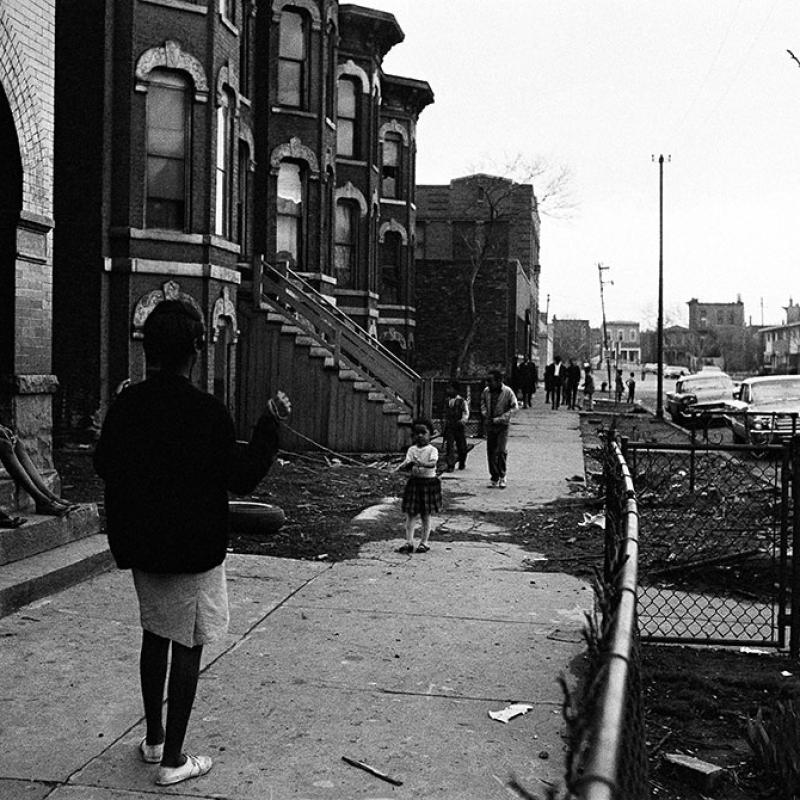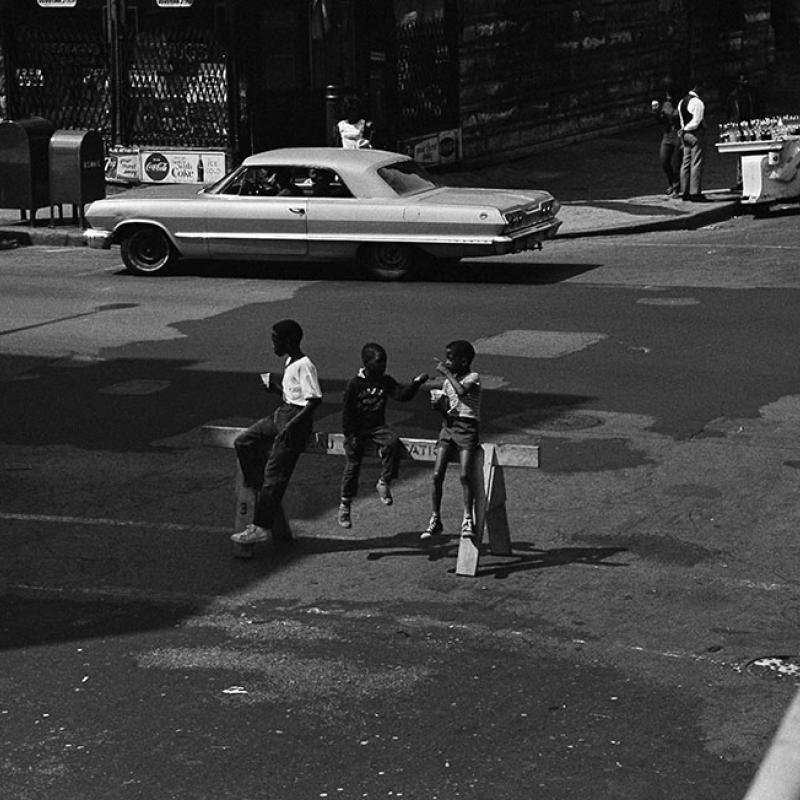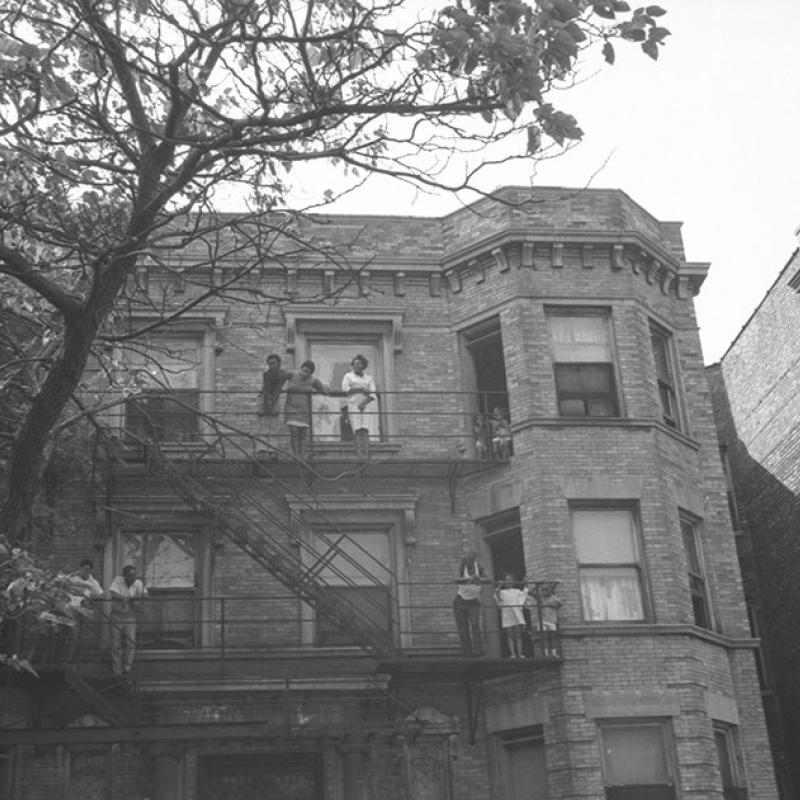Poems
southeast corner
The School of Beauty’s a tavern now.
The Madam is underground.
Out at Lincoln, among the graves
Her own is early found.
Where the thickest, tallest monument
Cuts grandly into the air
The Madam lies, contentedly.
Her fortune, too, lies there,
Converted into cool hard steel
And bright red velvet lining;
While over her tan impassivity
Shot silk is shining.
From A Street in Bronzeville (1945)
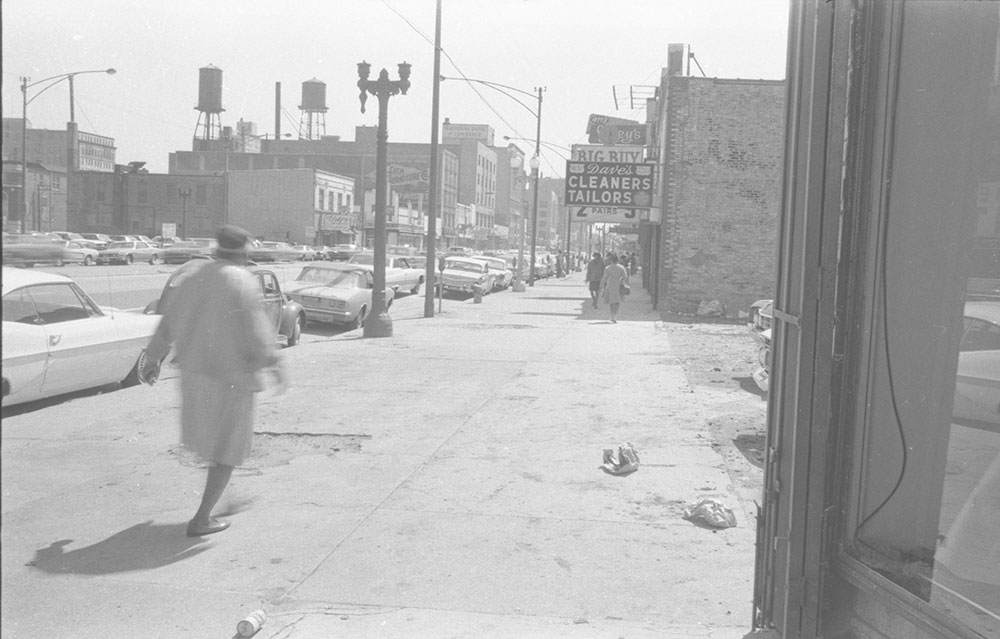
Chicago's South Side, 1970. Photography by Robert Sengstacke, courtesy of The Sengstacke Archive at The University of Chicago Visual Resources Center.
a song in the front yard
I’ve stayed in the front yard all my life.
I want a peek at the back
Where it’s rough and untended and hungry weed grows.
A girl gets sick of a rose.
I want to go in the back yard now
And maybe down the alley,
To where the charity children play.
I want a good time today.
They do some wonderful things.
They have some wonderful fun.
My mother sneers, but I say it’s fine
How they don’t have to go in at quarter to nine.
My mother, she tells me that Johnnie Mae
Will grow up to be a bad woman.
That George’ll be taken to Jail soon or late
(On account of last winter he sold our back gate).
But I say it’s fine. Honest, I do.
And I’d like to be a bad woman, too,
And wear the brave stockings of night-black lace
And strut down the streets with paint on my face.
From A Street in Bronzeville (1945)
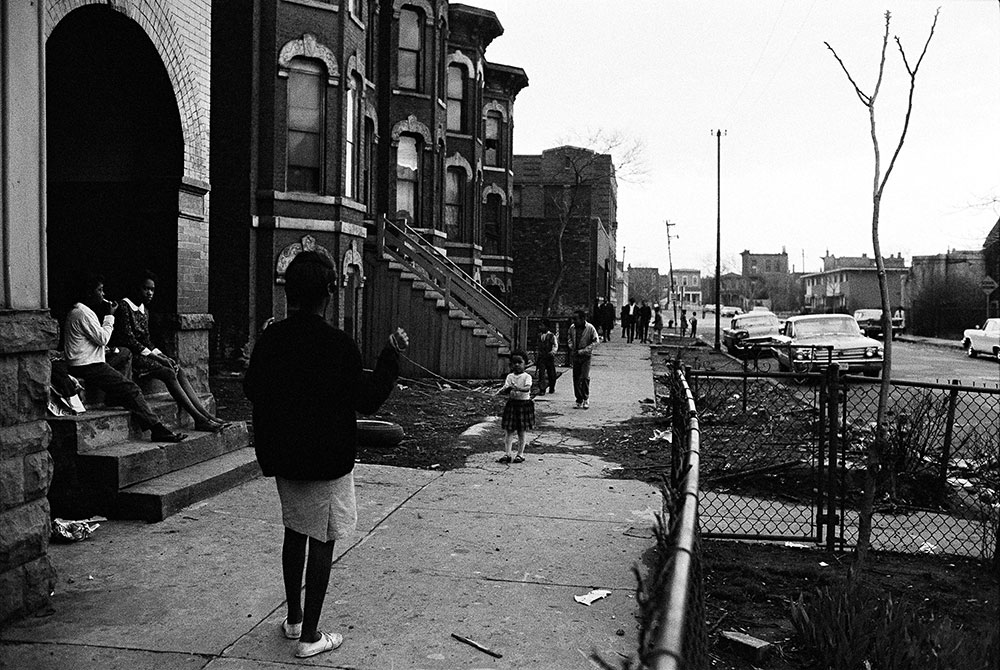
Children play outside of their homes in Bronzeville, 1967. Photography by Robert Sengstacke, courtesy of The Sengstacke Archive at The University of Chicago Visual Resources Center.
of De Witt Williams on his way to Lincoln Cemetery
He was born in Alabama.
He was bred in Illinois.
He was nothing but a
Plain black boy.
Swing low swing low sweet sweet chariot.
Nothing but a plain black boy.
Drive him past the Pool Hall.
Drive him past the Show.
Blind within his casket,
But maybe he will know.
Down through Forty-seventh Street:
Underneath the L,
And Northwest Corner, Prairie,
That he loved so well.
Don’t forget the Dance Halls—
Warwick and Savoy,
Where he picked his women, where
He drank his liquid joy.
Born in Alabama.
Bred in Illinois.
He was nothing but a
Plain black boy.
Swing low swing low sweet sweet chariot.
Nothing but a plain black boy.
From A Street in Bronzeville (1945)

A Chicago L train rounds the track, 1968. Photography by Robert Sengstacke, courtesy of The Sengstacke Archive at The University of Chicago Visual Resources Center.
my dreams, my works, must wait till after hell
I hold my honey and I store my bread
In little jars and cabinets of my will.
I label clearly, and each latch and lid
I bid, Be firm till I return from hell.
I am very hungry. I am incomplete.
And none can tell when I may dine again.
No man can give me any word but Wait,
The puny light. I keep eyes pointed in;
Hoping that, when the devil days of my hurt
Drag out to their last dregs and I resume
On such legs as are left me, in such heart
As I can manage, remember to go home,
My taste will not have turned insensitive
To honey and bread old purity could love.
From A Street in Bronzeville (1945)
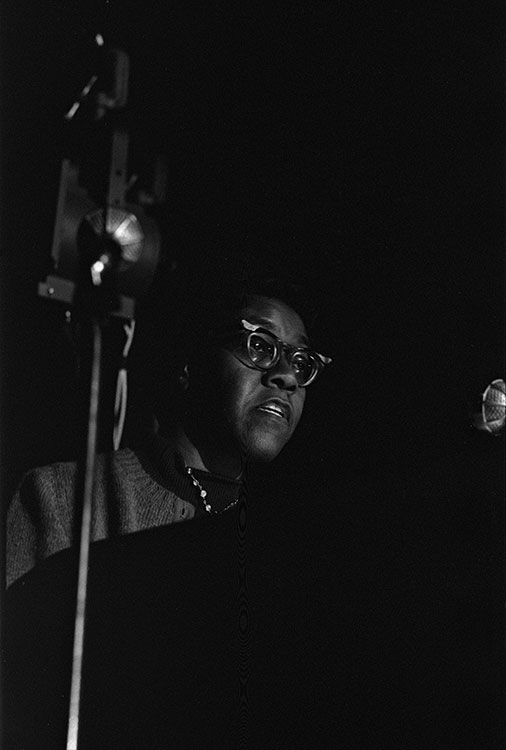
Brooks speaks at Affro-Arts Theater, 1968. Photography by Robert Sengstacke, courtesy of The Sengstacke Archive at The University of Chicago Visual Resources Center.
The birth in a narrow room
Weeps out of western country something new.
Blurred and stupendous. Wanted and unplanned.
Winks. Twines, and weakly winks
Upon the milk-glass fruit bowl, iron pot
The bashful china child tipping forever
Yellow apron and spilling pretty cherries.
Now, weeks and years will go before she thinks
"How pinchy is my room! How can I breathe!
I am not anything and I have got
Not anything, or anything to do!"-
But prances nevertheless with gods and fairies
Blithely about the pump and then beneath
The elms and grapevines, then in darling endeavor
By privy foyer, where the screenings stand
And where the bugs buzz by in private cars
Across old peach cans and jelly jars.
From Annie Allen (1949)

Young people gathered on fire escapes on Chicago's South Side, 1970. Photography by Robert Sengstacke, courtesy of The Sengstacke Archive at The University of Chicago Visual Resources Center.
truth
And if sun comes
How shall we greet him?
Shall we not dread him,
Shall we not fear him
After so lengthy a
Session with shade?
Though we have wept for him,
Though we have prayed
All through the night-years—
What if we wake one shimmering morning to
Hear the fierce hammering
Of his firm knuckles
Hard on the door?
Shall we not shudder?—
Shall we not flee
Into the shelter, the dear thick shelter
Of the familiar
Propitious haze?
Sweet is it, sweet is it
To sleep in the coolness
Of snug unawareness.
The dark hangs heavily
Over the eyes.
From Annie Allen (1949)
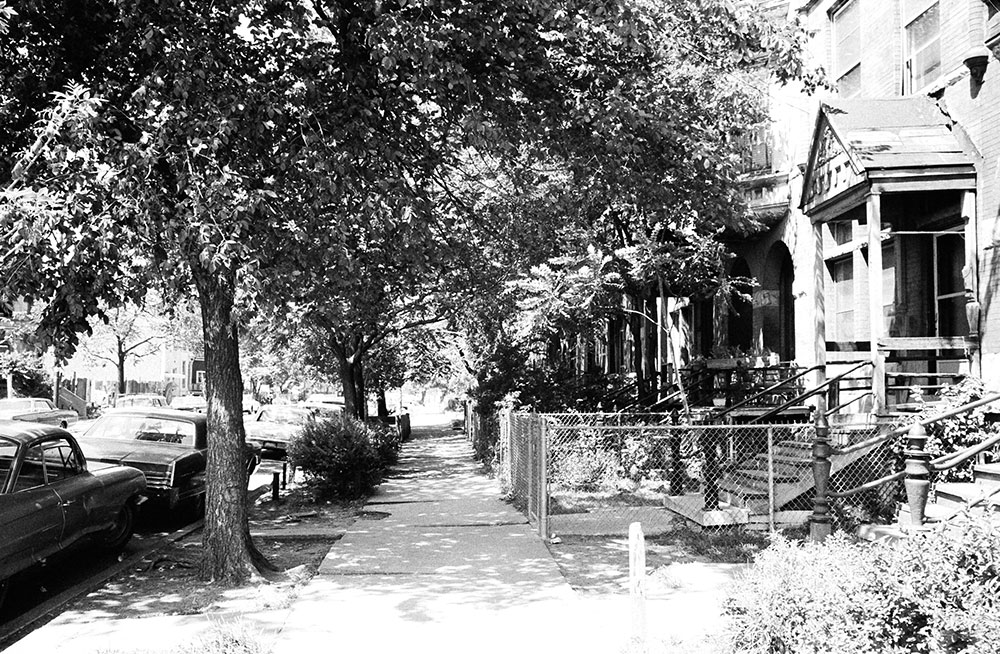
Residential street in Chicago. Photography by Robert Sengstacke, courtesy of The Sengstacke Archive at The University of Chicago Visual Resources Center.
The Last Quatrain of the Ballad of Emmett Till
(After the murder, After the burial)
Emmett's mother is a pretty-faced thing;
the tint of pulled taffy.
She sits in a red room,
drinking black coffee.
She kisses her killed boy.
And she is sorry.
Chaos in windy grays
through a red prairie.
From The Bean Eaters (1960)

Woman stands in front of Unity Hall, a historic building for black political organizing in Chicago, 1967. Photography by Robert Sengstacke, courtesy of The Sengstacke Archive at The University of Chicago Visual Resources Center.
The Artists' and Models' Ball (For Frank Shepherd)
Wonders do not confuse. We call them that
And close the matter there. But common things
Surprise us. They accept the names we give
With calm, and keep them. Easy-breathing then
We brave our next small business. Well, behind
Our backs they alter. How were we to know.
From The Bean Eaters (1960)

Gallery viewing at the South Side Community Art Center, 1967. Photography by Robert Sengstacke, courtesy of The Sengstacke Archive at The University of Chicago Visual Resources Center.
Speech to the Young, Speech to the Progress-Toward (Among them Nora and Henry III)
Say to them,
say to the down-keepers,
the sun-slappers,
the self-soilers,
the harmony-hushers,
"Even if you are not ready for day
it cannot always be night."
You will be right.
For that is the hard home-run.
Live not for battles won.
Live not for the-end-of-the-song.
Live in the along.
From Family Pictures (1970)
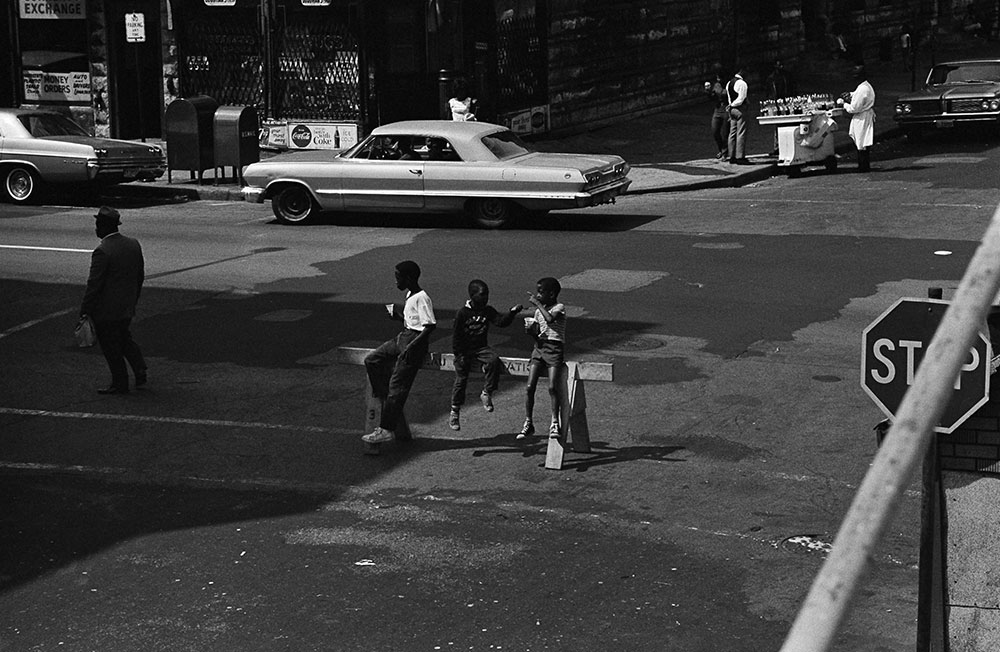
Young people gathered near the Wall of Respect in Chicago, 1967. Photography by Robert Sengstacke, courtesy of The Sengstacke Archive at The University of Chicago Visual Resources Center.
